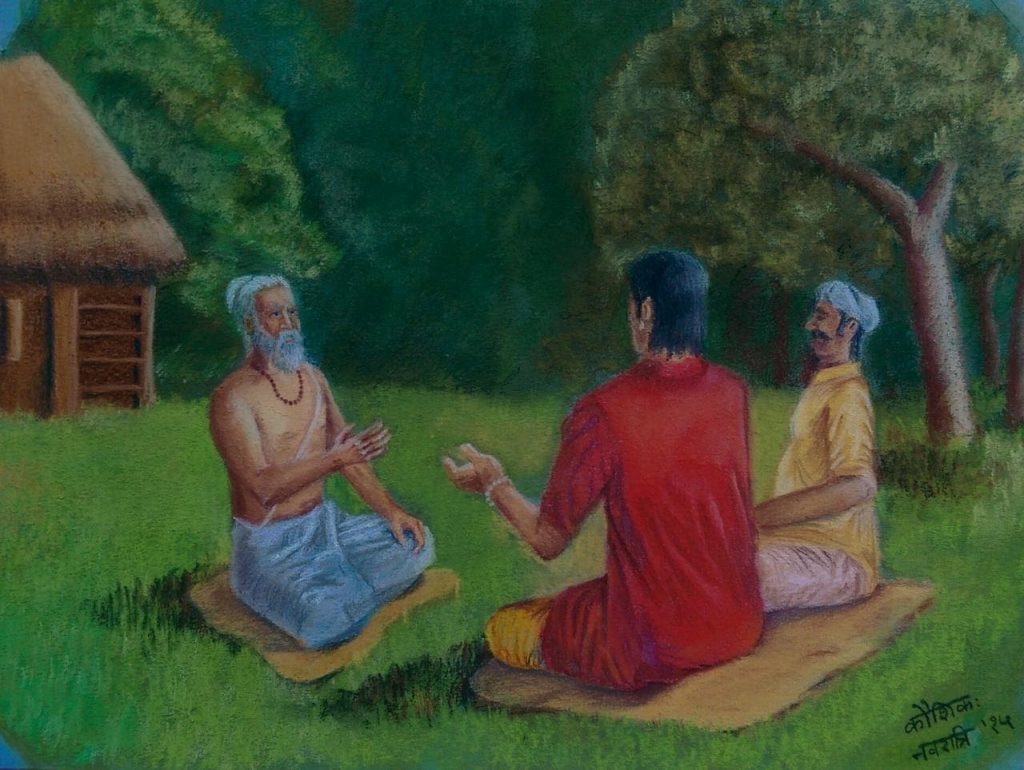As Navratri ends, the preparation for Deepavali begins.
From one journey, to another.
Deepavali is the biggest celebration in India, and the beginning of a new year. A lot goes into preparing for it – from cleaning our houses to cleaning our minds. Gifts to purchase, sweets to order, small dreams to fulfill.
As I go about it, in the midst of a busy work schedule, I feel that time is short, and the excitement is high. Enjoy every bit of it:)
A small thing about Deepavali purchases. As much as you can, try to purchase traditional items – Indian sweets, savories, diyas (not candles) and the like. Chocolates are not for Deepavali, nor are cookies. And buy from small sellers if possible. Try and light up their Deepavali as well:)
Read the previous part here…
Suratha said “Oh revered Rishi! we are grieving. I lost my kingdom, yet I feel attached to everything that is associated with it. My elephant, my people, my treasury…And this is Samādhi. He was disowned by his family, and yet he feels affectionate towards them. He still thinks about their welfare. And so, both him and I came here thinking that we will feel better, in such tranquility, but the opposite seems to be happening. We are torn by our own internal turmoil, and the result is more misery. We are men of knowledge – I would have expected both of us to know better than to think this way. Please help us, please guide us…”

And having narrated the three caritas, Rishi Medhas concluded by saying that the Devi makes it possible to experience the world, she is the one who confers knowledge and she is the one who makes us experience bhoga (which means experience of pleasure or pain), svarga and apavarga (liberation).
At this point in the Devi Mahatmyam, Rishi Mārkandeya returns as the primary narrator, and speaks of the penance that Suratha and Samādhi perform to experience a darshana of the Devi, She does appear to them, and grant them a boon each. Suratha asks for his kingdom, since he wishes to complete his earthly duties as a king, and continue his pursuit of dharma. Samādhi, having realized the futility of seeking wealth and prosperity, seeks knowledge that will liberate him and merge him with the infinite consciousness.
The Devi Mahatmyam is as relevant today, as it has been for thousands of years. Our existence has undergone many transformations on one level. We have moved on from a nomadic lifestyle, to an agrarian society, and then a city-based knowledge economy, and it seems that we have come a long way. After all, it has been a few thousand years. But in the scheme of things, on the time-scale of existence, in the eyes of kālā, we haven’t even registered as a speck of dust.
We tend to measure everything in human lifespans, not realizing that the 80-100 years that we live, is nothing compared to the billions and billions of years of known existence.
The suffering that Suratha and Samādhi went through, is what we go through even today. They may have lost different things, but the feeling is the same. It is funny, when you think of it. Here we are, at the pinnacle of human technology (compared to what has been) and at the brink of a leap of faith into artificial intelligence, with increasing human lifespans and advanced medical facilities – and yet, we are as fragile as we were thousands of years ago. Our problems are the same, and in many ways, we have regressed. Our families are smaller, our hearts are smaller, and our minds are more selfish. We are more disturbed mentally than ever before, and are constantly looking for resolutions.
This is where the Devi Mahatmyam stands out. It conveys, through the katha parampara, a way of working on the faults that lie within us, step by step, inch by inch, until we are cleaned and polished like a mirror, in which we can see our true selves. I will be repositioning the Sādhanā series to help address these issues of ours, so that we can recognize the Devi in us, and become better human beings, and leave a better world for our children.
It is then, that we can truly celebrate Vijayadashami – victory over our false self.
Keep trying – the road ahead is long, but together, we can get there…जय माँ दुर्गा!
